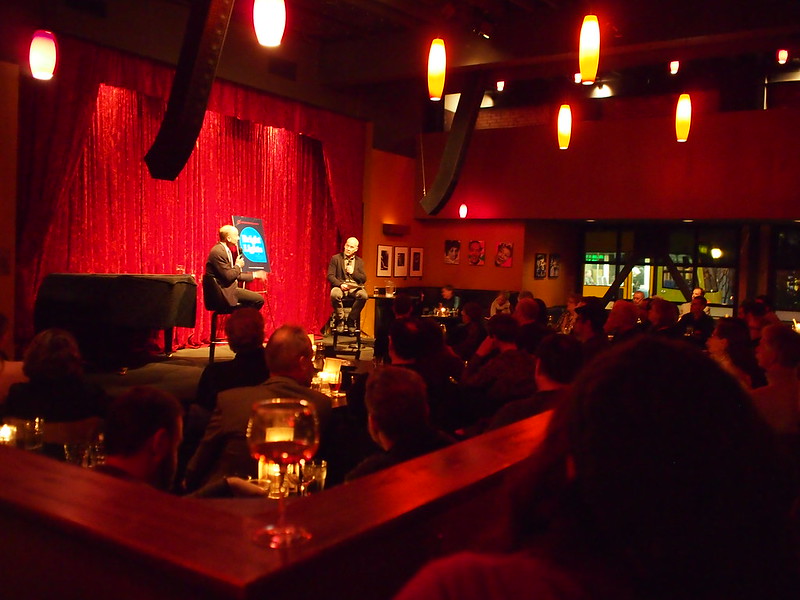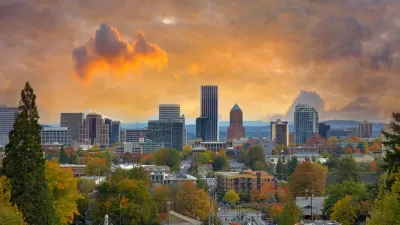Portland is a city that's often better known by the representations of it—like the television show Portlandia—than as an actual working city.
Portland is a city that's often better known by the representations of it—like the television show Portlandia—than as an actual working, breathing city, but as Winston Churchill noted, "a joke is a very serious thing." The people of Portland seem to acknowledge that even the most far-fetched representations of their city and its citizens have kernels of truth packed within them. Of course, even Portland, rife with a highly educated population that is sophisticated in all debates about planning policy, suffers from the same battles with NIMBYs and the usual antagonisms of a pro-development v. pro-environment debate. But it also has a regular live, on-stage discussion event on the topic of planning. That takes place in a jazz club. And when I attended last week, it was packed:

Bright Lights describes itself on its Facebook Page as:
Bright Lights has brought many of Portland's most dynamic leaders to stage to not only talk about issues facing the city but to reveal a little of themselves. The relaxed setting of Portland's leading jazz bar allows the audience to grab a drink and a bite and learn more about the city and the people shaping it. The question-and-answer format led by one of Portland's leading journalists helps get past the sound bytes and packaged messages. The audience is welcome to jump in, too.
Since commencing in February, 2008, Bright Lights has hosted guests as Neal Keny Guyer, CEO of Mercy Corps; Congressman Earl Blumenauer; then-Metro president David Bragdon; Erin Flynn, the city's director of economic development; leading structural engineer Ann Monier; advertising guru Dan Wieden; and many others. Bright Lights has also hosted guests who are shaping cities elsewhere: Tim Stonor of the groundbreaking London planning firm, Space Syntax; renowned New York exhibition designer Ed Schlossberg; and legendary Houston artist/activist Rick Lowe. As well, Bright Lights has hosted political debates for the offices of mayor and Metro president and brought leaders together to tackle issues such as the Columbia River Crossing and the Rose Quarter redevelopment.
We were there as a part of the ULI Rose Center's week-long Study Panel of the City through the Daniel Rose Fellowship. Through that program, Mayor Charlie Hales asked the Rose Center to take a look at promoting the city's Central Eastside as a 21st century employment center. The Bright Lights event kicked off the beginning of that week, and ULI CEO Patrick Phillips was the guest. Phillips spoke about a wide range of topics, from the changing expectations of the workplace, to demographic shifts and the impact of student debt on millennials' financial decision-making.

The host of Bright Lights is Randy Gragg, editor in chief of Portland Monthly magazine. Although the event seems to change locations occasionally, it is regularly hosted at Jimmy Mak's a hip and decidedly un-swish kind of jazz lounge that is, of course, right across from a streetcar stop. The February 2014 event attracted a crowd of about a hundred people.

I know that San Francisco has a monthly "Nerd Nite" event that often focuses on issues of urbanism, the Metropolitan Planning Council in Chicago hosts a regular "Urban Think and Drink" event, and Public Workshop holds regular "Urban Geek Drinks" soirees in Philly. What other social events does your city organize around these topics? And has our entire profession become a spoof from an episode of Portlandia that we enjoy getting together and spending our drinking time talking about this stuff?
Learn more about the ULI Rose Center's work in Portland or read coverage of it in the Portland Oregonian or the Portland Daily Journal of Commerce.

Alabama: Trump Terminates Settlements for Black Communities Harmed By Raw Sewage
Trump deemed the landmark civil rights agreement “illegal DEI and environmental justice policy.”

Planetizen Federal Action Tracker
A weekly monitor of how Trump’s orders and actions are impacting planners and planning in America.

The 120 Year Old Tiny Home Villages That Sheltered San Francisco’s Earthquake Refugees
More than a century ago, San Francisco mobilized to house thousands of residents displaced by the 1906 earthquake. Could their strategy offer a model for the present?

Opinion: California’s SB 79 Would Improve Housing Affordability and Transit Access
A proposed bill would legalize transit-oriented development statewide.

Record Temperatures Prompt Push for Environmental Justice Bills
Nevada legislators are proposing laws that would mandate heat mitigation measures to protect residents from the impacts of extreme heat.

Downtown Pittsburgh Set to Gain 1,300 New Housing Units
Pittsburgh’s office buildings, many of which date back to the early 20th century, are prime candidates for conversion to housing.
Urban Design for Planners 1: Software Tools
This six-course series explores essential urban design concepts using open source software and equips planners with the tools they need to participate fully in the urban design process.
Planning for Universal Design
Learn the tools for implementing Universal Design in planning regulations.
Clanton & Associates, Inc.
Jessamine County Fiscal Court
Institute for Housing and Urban Development Studies (IHS)
City of Grandview
Harvard GSD Executive Education
Toledo-Lucas County Plan Commissions
Salt Lake City
NYU Wagner Graduate School of Public Service




























